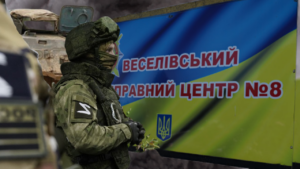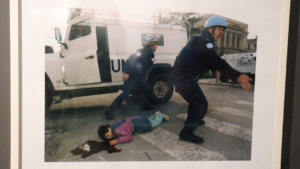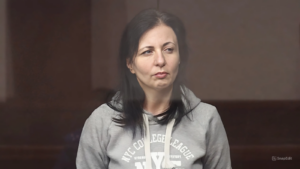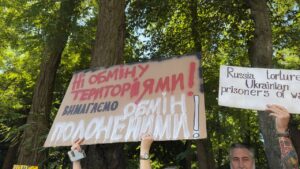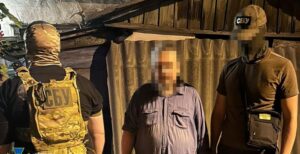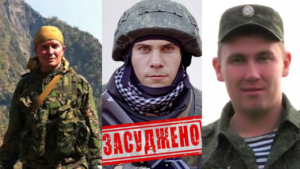«In my neighborhood alone 60 children grow up without fathers»
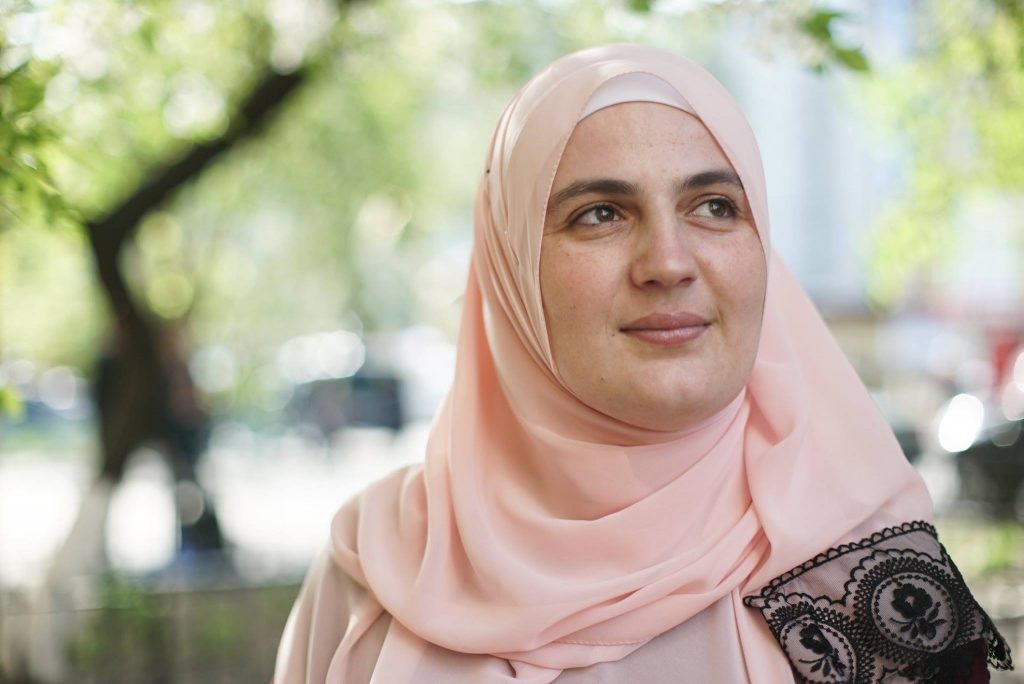
Powerful speech of activist Mumine Saliyeva on the situation in Crimea
On April 6-10, 2021 Media Initiative for Human Rights jointly with the CREES (Center for Russian, East European, and Eurasian Studies) of the University of Pittsburgh conducted a series of online-events dedicated to the occupied Crimea. It started with the “Homeward” film screening (2019, directed by Nariman Aliev) and proceeded with two discussions on the situation in Crimea, in particular, human rights situation and repressions against the Crimean Tatars. The recording of both discussions will be available soon and we will share them with you. All of the speakers were outstanding, but one of the most powerful, touching, and strong speeches that tore the hearts of listeners apart was the one performed by Crimean Tatar activist, member of the Crimean Solidarity group Mumine Saliyeva. It includes both stories about painful Crimean realities of nowadays and strong Crimean Tatars vision of the nonviolent struggle. We would like to share the text of Mumine’s speech with you. And, of course, to once again thank the CREES for organizing this series of events.
“Over the 7 years of the Russian control over Crimea the authorities have developed large-scale persecution of people in Crimea. Representatives of different nationalities are subjected to political persecution, but the main target of the Russian security forces has become a historically disloyal group – the Crimean Tatar people. The Russian authorities achieve their strengthening in Crimea both through arrests and through dozens of searches in houses and mosques, endless interrogations, and warnings issued by an active stratum of the people. For 7 years, officers of the FSB (Federal Security Service of the Russian Federation) and Center “E” (Center for Countering Extremism) opened in Crimea about a hundred criminal and administrative cases against Crimean Tatars.
Mejlis – the executive body of the Kurultay (assembly) of the Crimean Tatar people has been declared an extremist organization and banned. Criminal cases are initiated against the Crimean Tatars, mainly on membership in Hizb ut-Tahrir, an unjustifiably recognized terrorist organization and banned in Russia, but freely operating in Ukraine and a number of countries of the world at the level of national legislation. The Crimean Tatars are regularly searched and interrogated, after which people are taken into custody. Those who simply came to support a neighbor who is being searched are often detained.
As a reaction to repressions in Crimea on ethnic and religious grounds, the Crimean Solidarity movement was born. It is an association of relatives of political prisoners, lawyers, jurisconsults, and activists. As a result, the activists of the “Crimean Solidarity” also become targets of persecution for journalistic, human rights, and volunteer activities. Since 2014, the Russian authorities have been systematically destroying independen t journalism in Crimea. At the same time, propaganda state media are imposed. The place of professional independent journalism was taken by the activists of the Crimean Solidarity, covering the lawlessness of the security forces – citizen journalists. Then the criminal regime decided to hit them too. The most massive raids took place in March 2019, when 23 activists were arrested in one day – journalists, human rights defenders, volunteers. But the regime failed to frighten the people. Even more caring people have joined the peaceful struggle. Today, we can safely say that civic journalism in Crimea is alive and openly declaring itself, despite the threat of being imprisoned. I want to draw your attention to these guys. They are conducting information resistance within the framework of a peaceful struggle. In fact, they have become a free mouthpiece broadcasting from Crimea. The authorities failed to mix their names with dirt and show the world a distorted false picture of “catching terrorists”.
As part of the so-called “terrorist cases”, more than 70 people have now been arrested, of which 50 are Crimean Solidarity activists on apparently trumped-up charges. According to international human rights organizations HRW, Amnesty International, Freedom House, such criminal cases in Crimea are used as a repressive tool against Crimean Tatars who openly express their religious and political views. This is targeted bullying of people who are not afraid to express their opinion. All those arrested face huge sentences – from 15 to 20 years in prison in a strict regime colony. Persons are deprived of their liberty in the absence of an event or corpus delicti, in violation of the norms of international law, being held hostage in the militarized Russian troops and occupied territory. And isn’t it strange, in a territory where there was not a single terrorist attack, not even a hint of it, people of the same nationality and the same creed are accused and imprisoned for insane terms? In many families, all men have been arrested: brothers from one family, father, son, and son-in-law from another. And such cases are not isolated. This is already massive persecution of entire families. Not only men are persecuted, but also women, in relation to which administrative and criminal cases are also fabricated. About 200 children were left without fathers. The childhood of these children ended on the day when FSB officers broke into their homes in the early morning. Since that day, none of them feel safe. Their usual life collapsed in an instant. Oppression by the security forces is spreading in a huge wave throughout the Crimean Tatar society – and their consequences will be felt for a long time.
Today, the Crimean Tatar people draw historical parallels with the past. The grandfather of the now arrested Lenur Khalilov was also subjected to repression by the Russian regime. This is what his elderly mother Resuda Reshitova told after the searches: “My father graduated from a madrasah and was an imam (the spiritual head of the Muslims). After graduating from the age of 20, he worked in the village of Ay-Serez. Before the expulsion, in Crimea, my father taught the basics of religion and the Crimean Tatar language. After the deportation, we ended up in the Urals. On the second day, the commandants went and created lists of arrivals, in which they noted the person’s profession. My uncle then told my father: “If they come to us now and ask about your profession, I will give you a saw sharpener, tell them that you sharpen saws, just do not tell them that you are a religious leader.” Father was summoned to the commandant and taken to the commander. After that, he never returned. Many years later, we learned that my father was then imprisoned for 8 years. He ended up in the Yaroslavl region.”
Almost every family of today’s political prisoners has identical stories. The only difference is that then the Crimean Tatars were persecuted by the NKVD (People’s Commissariat of Internal Affairs) of Crimea and accused of “counter-revolutionary agitation”. Troikas * of the NKVD of the Crimean ASSR (Autonomous Soviet Socialist Republic) sentenced to death many religious leaders, intellectuals, and activists of that time.
* Troikas of the NKVD of the USSR – bodies of administrative (extrajudicial) repression at the republican and regional departments of the NKVD of the USSR, created in order to carry out an operation to repress “anti-Soviet elements” and operated in the USSR from August 1937 to November 1938. They consisted of three people – the chief, the secretary of the regional committee, and the prosecutor, which explains this name.
What is happening in Crimea today is classic political repression. Against the background of these repressions, there is another side of human stories – wives, mothers, children, about whom I would also like to tell a little. I live in Bakhchisarai. In the micro district of compact residence of the Crimean Tatars. Here on every street lives a family of a political prisoner – in my neighborhood alone 60 children grow up without fathers. 10 of them – with serious illnesses, which began to progress after the arrest of their fathers. Armed artillery of security officials burst into the houses of peacefully sleeping people, breaking doors, windows, and shards of glass fell on the children. All these consequences did not go unnoticed. The childhood of these children turned into trips to courts, to visit their fathers in colonies hundreds of kilometers from home. The children of the dentist Zevri Abseitov have not seen their father for 5 years. And just a few days ago they left for a long-term date (3 days) 800 km from Crimea. And the daughter of the political prisoner Eldar Kantemirov, Jamilya, spent a long time choosing a dress in which she planned to go to court to her father, whom she had not seen for many years. There are also 12 children who were born after the arrest of their fathers, they do not even know their fathers and have never seen them. During these years, we have buried 16 mothers and fathers of political prisoners who never received their sons. And it really hurts me to talk about it.
Of course, there is a bright side to all this. This is the consolidation of the people, who have a colossal historical experience of peaceful resistance behind their backs. The mentality of the Crimean Tatars is as follows – to overcome all difficulties in unity. Because where there is unity, there is victory.”


